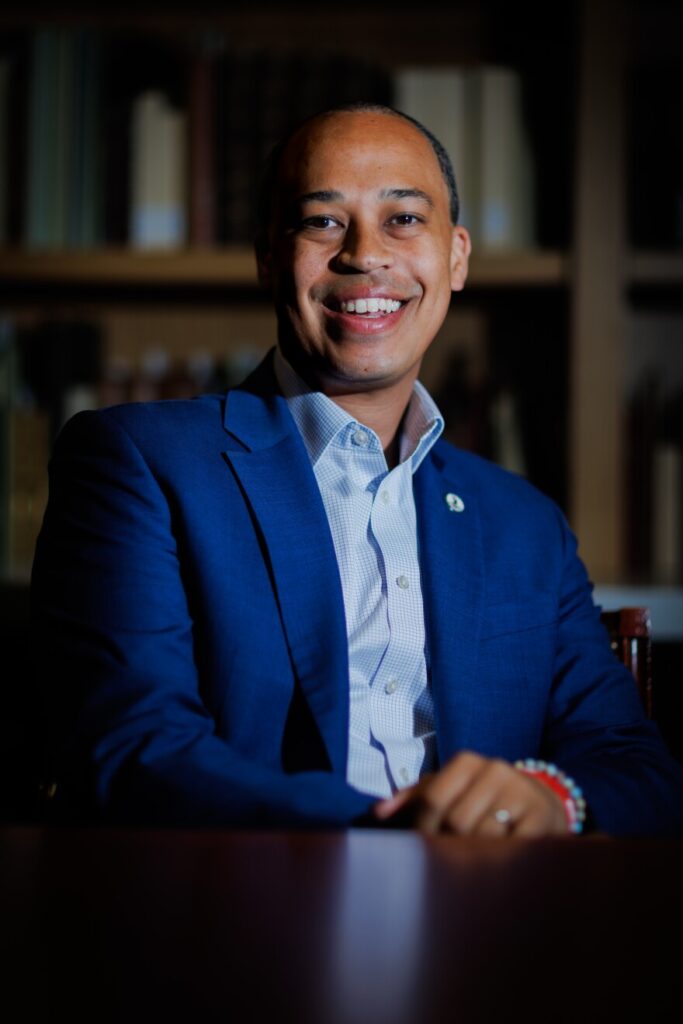
When the news broke that Jay Jones had been elected Virginia’s next attorney general, the headlines focused on the scandal he overcame and the history he made. At just 36, Jones became the first Black attorney general in Virginia’s long political history — a victory made even more remarkable given the controversy that nearly ended his career before it began.
But beneath the political drama lies a deeper story — one of resilience, redemption, and a relentless belief in second chances.
From Norfolk Roots to Statewide Prominence
Jay Jones’s journey to the state’s top legal office began in the city of Norfolk, where his family’s history runs deep. Born in 1989, he grew up watching his father, Jerrauld Jones, serve as a respected judge and legislator — one of the first Black members of the Virginia General Assembly. From a young age, Jay understood both the burden and opportunity of legacy.
After earning degrees from William & Mary and the University of Virginia School of Law, Jones worked in consumer protection law, advocating for ordinary Virginians against corporate abuse and price gouging. His work reflected the values that would later define his political brand: fairness, accessibility, and accountability.
In 2017, he was elected to the Virginia House of Delegates, representing the 89th District. His tenure was marked by practical progressivism — introducing bipartisan legislation like the Ashanti Alert Act, a missing-person alert system that went on to influence national policy.
Jones’s early political career seemed destined for steady ascent — until scandal struck.
The Scandal That Nearly Ended His Career
In 2022, private text messages from years earlier surfaced — messages in which Jones used violent and offensive language about a political rival. The revelations were met with swift condemnation from both parties.
For many, it looked like the end of his political ambitions. But Jones did something rare in today’s political world: he didn’t deflect or deny.
He issued a public apology, took full responsibility for his words, and stepped back from public office to reflect. During that time, he became a father and quietly returned to legal work, focusing on community advocacy and mentoring young Black lawyers.
Those close to him describe that period as a time of personal reckoning — but also renewal. Jones began speaking more openly about accountability, growth, and how mistakes can become turning points.
“We can’t control our past, but we can control what we learn from it,” he told supporters during his campaign.
“I learned that leadership isn’t about never falling — it’s about standing back up and choosing to be better.”
That mindset would prove crucial as he launched what many viewed as an unlikely comeback.
The Comeback Campaign
When Jay Jones announced his run for attorney general in early 2025, few political insiders took it seriously. The scandal was still fresh in voters’ minds, and his opponent, incumbent Jason Miyares, had strong establishment backing.
But Jones’s campaign didn’t look like a typical political machine. It was grassroots, community-driven, and deeply personal. His message wasn’t about perfection — it was about perseverance.
He spoke openly about the scandal, never dodging tough questions. That transparency, combined with his track record of public service, began to rebuild trust.
Instead of relying on big donors, he focused on small-dollar contributions and direct outreach — especially in underserved communities across Virginia. His authenticity resonated with voters who were tired of polished soundbites and party rhetoric.
By the time the votes were counted on November 4, 2025, Jay Jones had done the unthinkable: he defeated the incumbent and rewrote Virginia’s political history.
A Story of Resilience and Redemption
Jones’s victory is not just a comeback story — it’s a case study in resilience.
- Resilience after scandal: Instead of disappearing from public life, Jones faced his mistakes head-on. His willingness to own them, learn, and evolve became a central narrative of his campaign.
- Resilience in identity: As a Black attorney general in a state with a complex racial history, his win carries deep symbolic power — reflecting how far Virginia has come and how much farther it must go.
- Resilience of mission: Even amid controversy, Jones kept his focus on tangible issues — consumer protection, fair housing, and justice reform. His refusal to be defined solely by the scandal is itself an act of perseverance.
The Man Behind the Office
Beyond politics, Jones’s story is also one of personal growth. He has spoken about how fatherhood shifted his perspective, grounding him and reminding him of what truly matters. His marriage, his faith, and his family’s legacy all serve as touchstones in his life.
Friends describe him as a calm, determined, and reflective leader, one who carries both the pressure of expectation and the humility of experience. Those who have followed his journey see a man transformed — not by ambition, but by adversity.
What Comes Next
As attorney general, Jay Jones now faces the immense challenge of governing a divided state, where every decision will be scrutinized. His promises — from cracking down on corporate abuses to protecting voting rights — will test his ability to balance idealism with pragmatism.
But if his past is any indication, Jones will meet those tests with the same resilience that carried him through scandal, skepticism, and self-doubt.
His win is not just political — it’s human. It’s about how a person can stumble, learn, and rise again, proving that leadership is not the absence of failure but the courage to grow through it.
Conclusion
Jay Jones’s story reminds us that resilience isn’t only about weathering storms — it’s about emerging wiser, stronger, and more compassionate on the other side.
From Norfolk’s neighborhoods to the state’s highest law office, his journey shows that redemption is not only possible, but powerful — and that the most meaningful victories are the ones that begin in moments of doubt.
“I’ve learned that resilience isn’t about never falling,” Jones said on election night.
“It’s about believing that, no matter how hard it gets, you can always get back up.”
In the end, that belief carried him — and may well carry Virginia — into a new chapter.
Who He Is
Jay Jones is a native of Norfolk, Virginia, born in 1989. Wikipedia+1 He pursued higher education at the College of William & Mary and earned his law degree from the University of Virginia. Democratic Attorneys General Association+1
Early in his legal career, he served as an Assistant Attorney General in Washington, D.C., working in the Office of Consumer Protection, where he focused on consumer rights and tackling corporate abuses. Democratic Attorneys General Association+1
He then entered elected office, winning a seat in the Virginia House of Delegates (the 89th district) in 2017 and serving through January 2022. Wikipedia+1
Why He’s Making News
- On November 4, 2025, Jones won the statewide election for Attorney General of Virginia, defeating the incumbent Jason Miyares. He becomes the first Black person to hold the office in Virginia. The Washington Post+1
- The victory is significant in a state seen as a national bellwether—especially in an environment of shifting political dynamics. AP News+1
- The win came despite a major campaign-scandal: in 2022 Jones sent private text messages that fantasised about violence against a political rival. Politico+1
Hidden Facts & Context
- Jones’ family has deep roots in Norfolk (his family presence in the region stretches back generations). Democratic Attorneys General Association
- While in the House of Delegates, he authored the “Ashanti Alert” law—a missing-adult alert system used in Virginia and that has drawn attention nationally. Virginia Mercury+1
- He paused his legislative career (he didn’t stand for re-election in 2021) amid becoming a father—a decision that signals the personal side of his life. Virginia Mercury+1
- Beyond politics, his legal work in the D.C. consumer protection office included fighting large-corporation mergers and price-gouging. Jay Jones+1
Where Resilience Comes In
1. Overcoming the scandal
The text-message controversy in 2022 threatened to derail his campaign. He was accused of advocating violence, which drew bipartisan condemnation. Politico+1 Rather than withdraw, Jones publicly apologised, took responsibility, and doubled down on his campaign. That ability to face a major setback and still push forward is a mark of resilience.
2. Bouncing back politically
After stepping away from the House of Delegates in 2022, Jones returned to run for higher office. He secured the Democratic nomination in June 2025 and then won the general election in November 2025. Jay Jones+1 Coming back from a period out of office and winning a statewide race shows perseverance.
3. Focus on mission, not just the controversy
Despite the distraction of scandal, Jones kept his campaign aligned around specific issues: consumer protection, affordability, public safety and civil rights. For example, his campaign plan promised to challenge corporate price-gouging and defend fundamental rights in Virginia. Jay Jones+1 That shows resilience of purpose—the mission stayed in focus even when distractions arose.
4. Historic barrier-breaking
Winning the attorney general post as the first Black person in Virginia’s history to hold it isn’t simply symbolic; it marks the culmination of a path of resilience in a state with a difficult history of race and representation. AP News
Looking Ahead: What It Means
With Jones heading into office, his path will test that resilience further. He will lead the Commonwealth’s top law-enforcement and public-justice office at a time of high political expectations and scrutiny. The issues he highlighted—consumer protection, workers’ rights, public safety, defending rights—are ambitious. His success will depend on turning campaign messaging into results.
His story also signals something broader: that resilience in public life isn’t about being flawless—it’s about being accountable, returning after setback, and remaining committed to service despite turbulence.
Conclusion
Jay Jones’ election is about more than winning a race. It’s the result of a complex journey: legal work, legislative service, personal growth, public mistakes, and political redemption. Through it all, the theme of resilience stands out. He shows how a political figure can confront errors, learn, stay mission-driven, and rise.
His story holds lessons for leadership, public service, and for any one of us facing setbacks: resilience doesn’t mean no failure—it means standing back up, adjusting, and moving forward with purpose.







